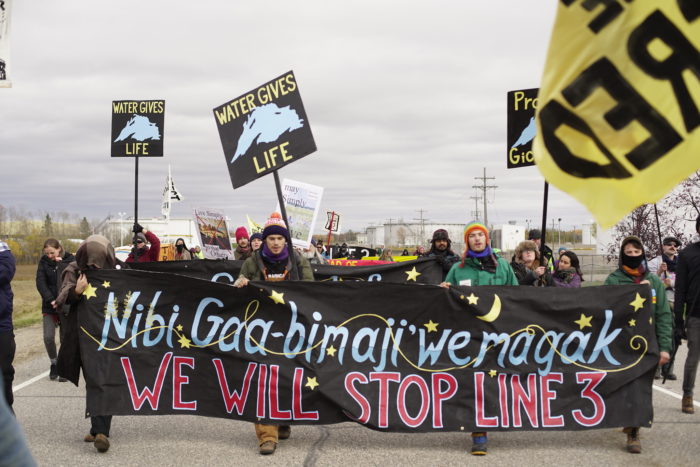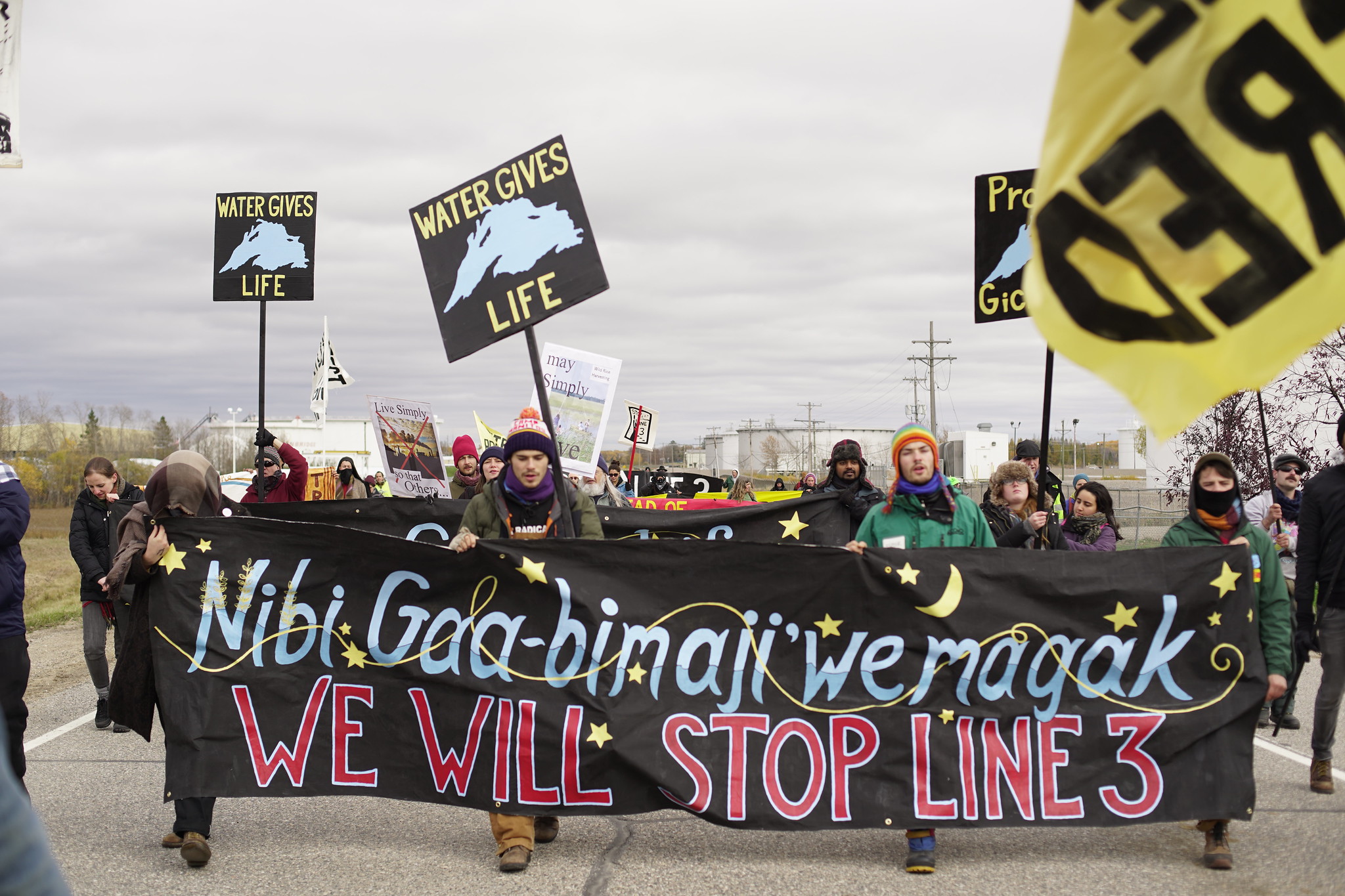
Despite decades of activism against tar sands led by Indigenous and First Nations communities, energy corporation Enbridge began construction on the toxic Line 3 tar sands pipeline in December. The timing to stop this pipeline of poison couldn’t be more urgent. Here’s how we’re supporting the movement to #StopLine3–and how YOU can join in.
Construction begins, despite COVID concerns
The multi-year, Indigenous-led resistance against the controversial Line 3 tar sands pipeline has reached a boiling point. In December, in spite of widespread community concerns around the threat of a COVID-19 spike, multinational energy giant Enbridge began construction on Line 3 in Minnesota.
Instead of backing down, we’re doubling down. At RAN, that means doing what we do best: supporting frontline Indigenous partners, organizing direct actions, and targeting the financiers and insurers behind this toxic pipeline. Our mission: #StopLine3.
Once news of imminent construction broke, on-the-ground resistance quickly mobilized with a series of ongoing actions and rallies, as Indigenous leaders called on Governor Walz of Minnesota to halt pipeline construction. We’re ramping up pressure on Governor Walz and President Biden, who have both voiced concerns over the climate crisis and have the political power to intervene. Tell Biden that we need his support to #StopLine3.
From actions and rallies to direct support of Indigenous allies
In December, Stop the Money Pipeline (STMP), a coalition of over 130 organizations including RAN, met the news of construction with a digital rally featuring Indigenous frontline defenders and Representative Ilhan Omar of Minnesota to #StopLine3. The day included 165 letter deliveries and close to 2,000 emails to bank managers and execs. And in October, STMP joined with Indigenous and frontline communities for a day of solidarity against tar sands pipelines such as Keystone XL, Trans Mountain and Line 3, and their financial backers and insurers.
Through our Community Action Grants (CAG) program, we’re fast-tracking half a dozen grants to our frontline partners in Minnesota to support the Line 3 resistance at this crucial moment.
A huge thanks to YOU for making this work possible–from showing up to actions at the offices of the financial backers and insurers of pipelines, like Liberty Mutual, Chase, and BlackRock, to coming together for an online rally featuring Indigenous speakers to donating to our CAG program. Together, we are holding Wall Street accountable!
Indigenous and First Nations’ leadership at the heart of resistance
For decades, Indigenous and First Nations communities have been leading the resistance against tar sands pipelines from Minnesota to Canada. This past October, over 40 Indigenous women leaders sent a letter to 70 major banks and insurers demanding policies that respect Indigenous Rights, ending funding for tar sands oil, and supporting a just transition towards a clean energy future. We are indebted to these leaders for raising the alarm, and continue to follow their leadership.
Plug into the resistance
Want to plug in further? We’re asking concerned people like you to get involved in three critical ways–
- Call Minnesota Governor Tim Walz’s office: (651) 201-3400 and the Minnesota Dept. of Health: (651) 201-5000 to demand a halt to construction;
- Tweet at the financiers behind Line 3, like JPMorgan Chase, Wells Fargo, Citibank, and Bank of America to demand they defund the project;
- Follow updates from people on the ground, such as Giniw Collective, Stop Line 3, RISE Coalition, Gitchigumi Scouts, and donate to these groups if you can.
Why tar sands oil is the worst
The Line 3 pipeline snakes from Canada down to Wisconsin, bringing it’s pipeline of poison through endangered wetlands, critical waterways, Indigenous lands, and alarmed communities. When this pipeline leaks, it will contaminate and pollute Indigenous treaty territories and their sacred wild rice lakes.
While all fossil fuels are detrimental to our climate, some are worse than others. The most destructive is tar sands oil. Tar sands oil produces three times the amount of greenhouse gas emissions as conventional oil, thanks to the energy-laden extraction process. If completed, the Line 3 pipeline could expand global tar sands production by up to 10%.
Together, we will #StopLine3
Momentum against the destructive Line 3 pipeline is gaining speed, thanks to a growing coalition of environmental groups, activists, landowners, and frontline communities led by Indigenous nations. At RAN, we’ve never backed down from a fight for people and planet–and with your support, we will #StopLine3.












